- Home
- Pat Barker
Noonday Page 16
Noonday Read online
Page 16
Needed to do something, cheer herself up. Sing. “Oh Danny boy, the pipes, the pipes are calling…” Singing always cheered you up. “But when ye come back, and all the flowers are dying, if I am dead, as dead I well may be…” Well, not always. What lifted her spirits was the spirits she had in her bag, but it was a bit early to be starting on that. Gin and cod’s head—dear God, what a combination. Hated bloody cod’s head, but it was cheap, and if it was a choice between food and gin—and these days it quite often was—gin every time. She was turning into a right old gin-lizzie—her mam would’ve been horrified. Though, truth be told, she’d liked a tipple herself. She’d been thinking a lot about her mam recently. Well, childhood, really. School. Didn’t do to think too much about that. Or anything else back then, really. Only she loved her mam.
Landing. Pause for breath—up we go again. Bloody stairs—they’d be the death of her. Still, the seances were picking up, partly because she was pushing the limits. All the time now. But forty people, ten bob a ticket, not bad, not that she’d see anything like her fair share of it. Howard would have told them. To be fair, whatever his faults, he was the one pushing her along. He’d seen the opportunities—she hadn’t. And the first few seances, my God…Every bloody spirit who showed up—manifested, Howard said—he was always correcting her—was fighting mad. Furious. “No use blaming the spirits, love,” Howard said. “It’s you, you’re attracting it.” “Oh, so it’s my fault, is it?” “Well, it’s not exactly your fault, but you’re going to have to calm it down a bit, love. Nobody’s going to pay good money to get whacked over the head with a chair.”
Last lap now. She was looking down at her feet—plod, plod, plod—so she didn’t see him at first. But she heard breathing, so she stopped and peered into the darkness. Couldn’t see a bloody thing, somebody had nicked the lightbulbs on the stairs, but then a long shadow peeled itself off the wall.
“Oh,” she said. “You.”
“Now, now, no need to be like that.”
He was smiling, big yellow teeth bared in a grin. She wanted to tell him to bugger off, but she didn’t dare. Feet squarely planted, he stood waiting for her to unlock the door. Bloody key wouldn’t work, her hands were shaking, and all the time he stood there, watching. Weasel-faced little shit. Said his name was Payne. Didn’t believe it. Said he was a policeman—didn’t believe that either. She could smell police a mile off, but—and this was the alarming bit—if he wasn’t police, what was he?
As soon as she got the door open, he followed her into the room, took his hat off, looked all round, taking his time, finally pulled out a chair and sat down.
“Make yourself at home, why don’t you?”
“Well, Mrs. Mason. What a pleasure to see you again.”
She wasn’t going to dignify that with a reply, so she went over to the window and pulled the blackout curtain across. Attic windows were always fiddly, but at least it give her a minute to think. She switched on the light, checked to see the chamber pot was well tucked under the bed, and turned to face him. “What do you want?”
“You did a seance last night.”
“Gave.”
“What?”
“You don’t do seances, you give them.”
“Bit rich, isn’t it, seeing you charge the poor buggers ten bob?”
“Oh, you were there, were you?”
“No, heard about it, though.”
“Oh, from Miss Pole, I suppose? I noticed she was there again.”
“Nothing to do with me. I believe she calls herself a ‘psychic investigator.’ ”
“She can call herself whatever the hell she likes, she’s still a twat.”
“Ah, Mrs. Mason, I have missed you.”
He was leaning forward, elbows on his knees, twirling his hat, a battered trilby, round and round in nicotine-stained fingers. She could see dark stains on the sweatband. His trousers, stretched tight across his bony knees, were shiny, almost threadbare. He had such a seedy, lonely, hangdog look about him—put you in mind of rooms in lodging houses with cracked washbasins and fanny hairs on the bottom sheet. And yet he was a clever man—perhaps “clever” wasn’t the right word—fly, that was it. It occurred to her, suddenly, that he might be the Devil. In a long and varied career she’d met quite a lot of people who’d seen the Devil and what always impressed her about them was that they described him in exactly the same way—not so much the Prince of Darkness, more a commercial traveler down on his luck. She was reminded of the men you used to see after the last war, selling silk stockings door to door, twitching that much they could hardly count out the change.
She sat down on the bed, folded her arms across her breasts. “It’s not against the law.”
“Taking money under false pretenses is. And you’re not seriously claiming you talk to the dead, are you?”
She sat, mute.
“Pull the other one, it’s got bells on. No, Mrs. Mason, what you do is fraud. Fraud.”
That word, it put her right back in the dock with that wretched little creep of a man telling everybody they’d got a doctor to examine her. “Every orifice,” he’d said. “Every orifice. And the rolls of fat on her belly.” He’d looked across at the jury and smirked. “You could hide a rat in there.”
She looked at Payne, who was also smirking. “I need the money.”
“You’ve got a job. Oh, no, sorry, you haven’t, have you? You got the sack. Well, get another one then.”
“Where? There aren’t any.”
“There’s always cleaning.”
“Too many houses boarded up, and besides it pays peanuts. Nobody could live on that.”
“Not with the gin and fags you get through.”
Bastard knew everything. “What am I supposed to have done this time?”
“Well, it’s more of an accumulation, really, isn’t it? The boy sailor from the Royal Oak? And then there was that soldier on the beach at Dunkirk. No air cover. Remember that. And then last night the boy from the school.”
“What about him?”
“You said there were seven hundred dead.”
“He said, and he didn’t say seven hundred, he just said ‘hundreds.’ ”
“The official figure’s seventy-three.”
“And do you know anybody who believes it? I don’t.”
“Look, it’s one thing to say it in private, it’s quite another to say it in public.”
“I don’t control what gets said.”
“ ’Course you bloody do!” He was leaning towards her again. “Look, Mrs. Mason, I’m going to say something that might surprise you—I don’t give a bugger where it comes from, you could be getting it all from the Devil for all I care, the point is: You can’t say it.”
She caught a flicker in his eye. “This frightens you, doesn’t it?”
“You frighten me. I think you’re a very stupid and very dangerous woman. And no, I don’t think you talk to the dead. I think you keep your ear to the ground, you ferret around for gossip and speculation and rumor and…Muck. And you spout it out without stopping to think about security or other people’s feelings or public morale or…or anything. Except money.”
“I tell the truth.”
“You wouldn’t know the truth if it bit you on the arse. Do you know, I’d have more respect for you if you stood on a street corner and peddled your fanny.”
She was up on her feet now. “I think you’ve stayed quite long enough.”
“Think about it.”
“What, peddling me fanny?”
“No, keeping the other hole shut.”
She couldn’t look at him. At the door he paused and looked back. “Because if you don’t, it mightn’t be fraud next time. It might be witchcraft.”
“What you gunna do, burn me?”
“No, I’m serious. You think about it now.”
After he’d left, she waited a few minutes then went out onto the landing to check he’d really gone, and wasn’t still there, in the darkness, hiding
. She was trembling all over—back in the dock, back in prison. They could do it. But not witchcraft—that didn’t make any sense. And it was all true, what she’d told him. She didn’t control what was said. Once Albert took over, the most she ever heard was a kind of echo.
She switched the light off, pulled the blackout curtains back and lay on the bed. Awkward shape, that window. They’d had one just like it in Newcastle. The night the bailiffs come and took every last stick of furniture, she’d lain on the floor, on a borrowed mattress—Howard snoring beside her—and seen a hand pressed hard against the glass. Her mam’s hand. She recognized it straight away from the scars on the palm, scars she’d got in the herring-gutting sheds in Seahouses. And she’d known straight away her mam had passed.
And she’d known something else too: that the dead came to her, sought her out, and there wasn’t a bloody thing she could do about it.
She needed to think, but when she closed her eyes and tried to concentrate, she was back in the dock. Every orifice, he’d said, smirking. “And the rolls of fat on her belly. You could hide a rat in there.” The faces in the courtroom had become a pink blur, she was back on the couch with her legs in stirrups, eyes shut, praying for Albert to come, but Albert didn’t come though she called and called for him. And when they let her sit up—take a breather, they said—she pushed them away and ran down into the street. Clinging to the railings, shouting and crying with the pins coming out of her hair and a woman in a fur coat come across to her and said, “What’s the matter, love? Are you all right?”
Of course, she had to go back in. Howard said it would look bad if she didn’t. So on it went: stomach, throat, nose, ears, fanny, arsehole, and yes, the rolls of fat on her belly. The least of her problems, that day…Howard sat outside in the waiting room. She went quiet towards the end, refusing to see the doctor’s face, the glint of glasses on his nose, refusing to feel the leather couch that made her back and thighs sweat, refusing to hear the chink of instruments in the bowl…And still Albert didn’t come.
But he was coming now. The room grew dim as she sank further and further into the hole that was opening up at the center of her being. At first she went slowly, but then faster and faster, swirling round, no longer able to see the window or feel the bed, down down down until at last the darkness covered her.
—
BERTHA CAME TO herself an hour later, with no sense of time having passed, though the square of sky in the window had faded from blue to white.
She was lying on the bed, though it seemed to have moved several feet across the floor. When she raised her head, she saw a chair lying on its side, plates and cups broken and a gray, sticky mess where the cod’s head had been stamped into the rug. Oh God. She didn’t blame Albert, not entirely, but didn’t he have a shred of common sense? Where was she going to find the money to buy new plates? And that rug was going to have to be thrown out. Of course he hated cod’s head, but so did she. Only, when Albert hated something, he went berserk. Always had done, probably always would. And of course, as per bloody usual, he left her to clear up the mess.
Tell you what, she wouldn’t be going to the shelter tonight, not with all this lot to clear up—no, not if it pissed bombs.
TWENTY-ONE
After the first few hours you lost track of time. He thought it was about three in the morning, but he couldn’t see his watch. In the doorway of a building opposite, a group of people, bombed out of a church basement, was waiting to be found space in other shelters. The usual purgatorial shadows. One of them, a woman, detached herself from the rest and gestured to him to come closer. He crunched towards her over broken glass. She pointed to a house farther down the street, the house she lived in—what was left of it. Her mouth was so caked with dust she had to moisten her lips several times before she could make herself understood. “There’s somebody still on the top floor.”
Brian Temple joined him and peered up at the house. “Well, whoever it is they’re a goner.” He was pointing to the side of the roof that had caved in. “If there is anybody.”
“She seems pretty definite.”
Charlie nodded. “Don’t see how we can ignore it.”
“I bloody do,” Brian said. “I’m sick to death of wild goose chases.”
“We’ll just have a look, right?”
They fetched a stretcher from the back of an ambulance and pushed the front door open. “Rescue-squad job, this,” Brian said. Charlie ignored him. He began creeping up the unlit stairs, testing every tread to make sure it would bear his weight. Brian was probably right, but then every available rescue squad had been called to Malet Street, where a bomb had fallen on a hostel. And the building seemed stable enough, nowhere near as bad as the houses on either side. At intervals, Charlie held up his hand and they stopped to listen. Creaks, an occasional louder crack, the grumbling of an injured building.
“I don’t think there’s anybody here,” Charlie said.
But then, on the third landing, they heard a groan and realized it was coming from a room above the attic stairs. These were narrow, room for only one person, and so steep it would be more like climbing a ladder. Charlie gestured to the others to stay back. Halfway up, there was a bend, and there he had to stop: a beam had fallen across the staircase, leaving only the narrowest of apertures. He shone his torch down onto their faces. “So who’s the thinnest?” This was a joke. He was grinning at Paul.
Right. Paul took off his coat and helmet, lay down, poked his head under the beam and started pushing with his heels, wriggling into the airless tunnel, inch by painful inch—a bit like being born but in reverse. Once, he got stuck and called back, “This isn’t going to work,” but then Charlie gave his backside a tremendous shove, his left shoulder broke through and he found extra space. Burrowing into the dusty darkness, mouth and nostrils choked with dust, eyes smarting, he wasn’t sure how much longer he could go on, but then, unexpectedly, he felt cool air on his face and neck and guessed the room beyond was open to the sky.
At least, now, he could see, and what he saw, when he finally managed to crawl into the room, was a woman with her nightdress rucked up to her thighs, lying across a mound of rubble. One leg was dark, covered in dried blood, the other fish-white. He couldn’t see her face or upper body, but the size of the thighs alone told him she was heavy, quite possibly a dead weight. She wasn’t moving. He tried not to hope she was dead. Dead, she could wait till morning. Alive, she was a nightmare.
As he’d thought, the roof was open to the sky. Searchlights probing banks of cloud cast a shifting light across the debris. Table, more or less intact—she must have been sheltering under that when the ceiling came in—bed broken, chair smashed, sink smashed, chamber pot mysteriously intact—and feathers everywhere. A blizzard of feathers. Bright orange flashes—three as he watched—lit up the room, each accompanied by the thud of high explosive. The walls shook. A saucepan skittered across the floor and came to rest by the sink.
Still not knowing if she was alive or conscious, he started saying the usual comforting words. “Don’t worry, love, we’ll soon have you out.” Reaching her ankle, he thought he detected warmth. Not much, but then for God knows how long she’d been lying in a room open to the sky. He crawled along her side till he was level with her shoulders and felt for a pulse in her neck. Irregular, but no mistaking it—she was alive. He tried to assess how badly injured she was, calling out to Charlie on the stairs that he thought she might have broken her leg. He didn’t like the angle of that knee.
Her eyes flickered open. “Hello, love,” he said. “Well, this is a right pickle, isn’t it?” A moan from the white-crusted lips. “Do you think you can stand?”
Before she could answer, a lump of plaster fell from the ceiling, narrowly missing his head. “Fucking hell.”
Charlie from the stairs: “You all right?”
“Never better.”
“We’re going to have to dig you out.”
They’d never get her down the stairs, not w
ithout moving that beam. Lying flat on his back, he stared through the hole in the roof. Flares blossomed and faded, each casting a trembling light across the floor. He listened to the sounds of scuffling and scraping on the stairs, then, propping himself up on his elbow, found himself gazing straight into her eyes. Christ, she was sweating, a slippery, cold sheen bringing with it the stench of fear and pain. “Not long now, love. They’ve just gone to get the shovels, they’ll have us out in no time.” No response. “I’m Paul. What’s your name?”
“Bertha.”
Was it her? My God, it was. He remembered her labored breathing as she climbed onto the platform, and thought: She’s not going to last.
A few minutes later came a renewed scrabbling on the stairs and Charlie’s hand appeared, waving a bottle of water. Paul crawled across to get it, and trickled some into her open mouth until she choked and turned her head away. Then he moistened his own lips. He’d have liked to take a good swig but he didn’t know how long he’d have to make the bottle last. He could hear shovels now, digging into the rubble. By rights, they should have left the building and waited for a rescue squad, but he knew they wouldn’t do that. They wouldn’t rest till they got her out.
Bertha lay motionless, her eyes closed, breathing through her open mouth. He’d wriggled into the narrow space between her and the wall and now lay pressed against her vast bulk. The film of sweat between his body and hers was acutely unpleasant. In the circumstances they were in, that shouldn’t have mattered, but it did. He tried to ease himself away from her, but there was no room, and whenever he moved she groaned.
“Yeah, I know,” a man’s voice said. “She turns my stomach too—all that lard.”
Paul froze, then made himself turn towards the voice. She looked different. Where before, there’d been only double chins and flabby cheeks, there was now the suggestion of a jaw. How could anybody change physically, like that?
“So, you know, go easy on her.” The voice was beginning to slur into silence. “She’s a poor beggar.”

 Border Crossing
Border Crossing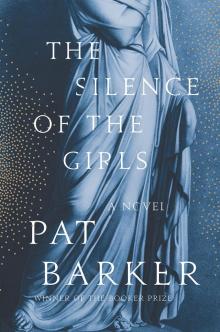 The Silence of the Girls
The Silence of the Girls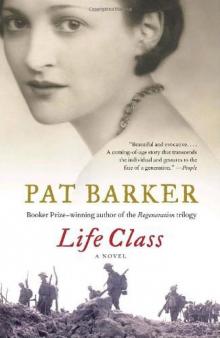 Life Class
Life Class Regeneration
Regeneration Another World
Another World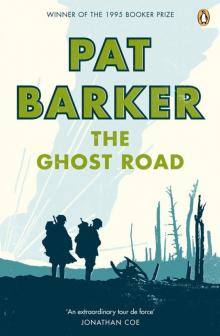 The Ghost Road
The Ghost Road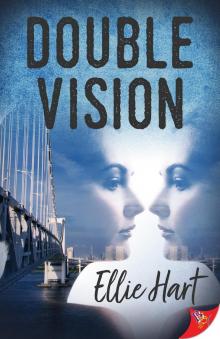 Double Vision
Double Vision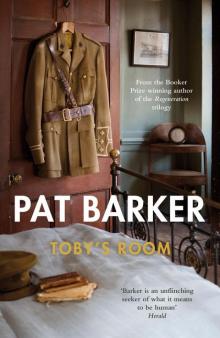 Toby's Room
Toby's Room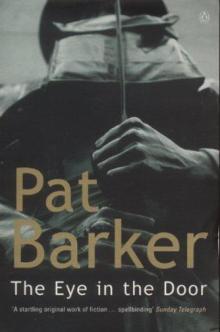 Regeneration Trilogy 02 - The Eye in the Door
Regeneration Trilogy 02 - The Eye in the Door The Eye in the Door
The Eye in the Door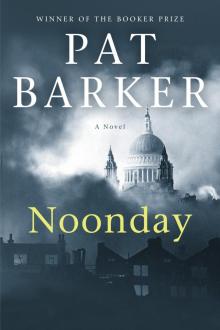 Noonday
Noonday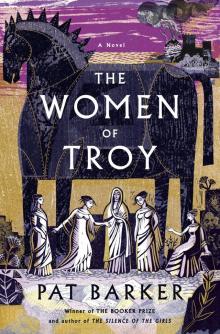 The Women of Troy: A Novel
The Women of Troy: A Novel